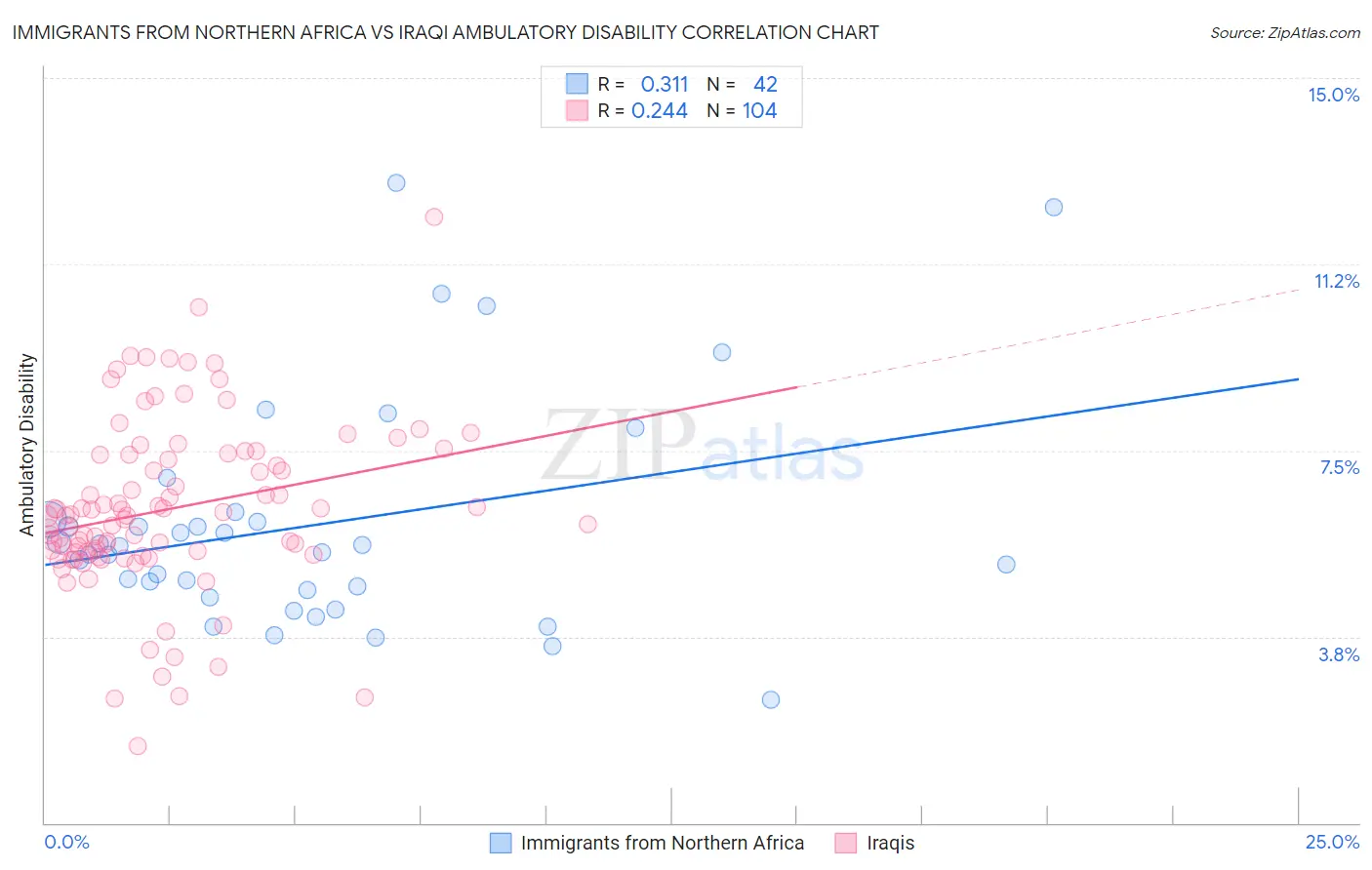Immigrants from Northern Africa vs Iraqi Ambulatory Disability
COMPARE
Immigrants from Northern Africa
Iraqi
Ambulatory Disability
Ambulatory Disability Comparison
Immigrants from Northern Africa
Iraqis
5.7%
AMBULATORY DISABILITY
99.4/ 100
METRIC RATING
73rd/ 347
METRIC RANK
6.1%
AMBULATORY DISABILITY
62.8/ 100
METRIC RATING
166th/ 347
METRIC RANK
Immigrants from Northern Africa vs Iraqi Ambulatory Disability Correlation Chart
The statistical analysis conducted on geographies consisting of 321,147,957 people shows a mild positive correlation between the proportion of Immigrants from Northern Africa and percentage of population with ambulatory disability in the United States with a correlation coefficient (R) of 0.311 and weighted average of 5.7%. Similarly, the statistical analysis conducted on geographies consisting of 170,645,130 people shows a weak positive correlation between the proportion of Iraqis and percentage of population with ambulatory disability in the United States with a correlation coefficient (R) of 0.244 and weighted average of 6.1%, a difference of 6.5%.

Ambulatory Disability Correlation Summary
| Measurement | Immigrants from Northern Africa | Iraqi |
| Minimum | 2.5% | 1.6% |
| Maximum | 12.9% | 12.2% |
| Range | 10.4% | 10.7% |
| Mean | 6.0% | 6.3% |
| Median | 5.5% | 6.2% |
| Interquartile 25% (IQ1) | 4.7% | 5.4% |
| Interquartile 75% (IQ3) | 6.1% | 7.4% |
| Interquartile Range (IQR) | 1.4% | 2.0% |
| Standard Deviation (Sample) | 2.3% | 1.7% |
| Standard Deviation (Population) | 2.3% | 1.7% |
Similar Demographics by Ambulatory Disability
Demographics Similar to Immigrants from Northern Africa by Ambulatory Disability
In terms of ambulatory disability, the demographic groups most similar to Immigrants from Northern Africa are Immigrants from Cameroon (5.7%, a difference of 0.010%), Brazilian (5.7%, a difference of 0.020%), Immigrants from Peru (5.7%, a difference of 0.040%), Immigrants from South Africa (5.7%, a difference of 0.060%), and Sudanese (5.7%, a difference of 0.080%).
| Demographics | Rating | Rank | Ambulatory Disability |
| Israelis | 99.6 /100 | #66 | Exceptional 5.7% |
| Immigrants | Uganda | 99.6 /100 | #67 | Exceptional 5.7% |
| Sri Lankans | 99.6 /100 | #68 | Exceptional 5.7% |
| Peruvians | 99.5 /100 | #69 | Exceptional 5.7% |
| Sierra Leoneans | 99.4 /100 | #70 | Exceptional 5.7% |
| Immigrants | Peru | 99.4 /100 | #71 | Exceptional 5.7% |
| Brazilians | 99.4 /100 | #72 | Exceptional 5.7% |
| Immigrants | Northern Africa | 99.4 /100 | #73 | Exceptional 5.7% |
| Immigrants | Cameroon | 99.4 /100 | #74 | Exceptional 5.7% |
| Immigrants | South Africa | 99.3 /100 | #75 | Exceptional 5.7% |
| Sudanese | 99.3 /100 | #76 | Exceptional 5.7% |
| Immigrants | Vietnam | 99.3 /100 | #77 | Exceptional 5.7% |
| Somalis | 99.2 /100 | #78 | Exceptional 5.7% |
| Chileans | 99.2 /100 | #79 | Exceptional 5.7% |
| Immigrants | Ireland | 99.2 /100 | #80 | Exceptional 5.7% |
Demographics Similar to Iraqis by Ambulatory Disability
In terms of ambulatory disability, the demographic groups most similar to Iraqis are Nicaraguan (6.1%, a difference of 0.020%), Basque (6.1%, a difference of 0.050%), Immigrants from Oceania (6.1%, a difference of 0.12%), Ecuadorian (6.1%, a difference of 0.13%), and Lebanese (6.1%, a difference of 0.20%).
| Demographics | Rating | Rank | Ambulatory Disability |
| Immigrants | Latvia | 71.1 /100 | #159 | Good 6.0% |
| Central Americans | 69.8 /100 | #160 | Good 6.0% |
| Immigrants | Belarus | 69.2 /100 | #161 | Good 6.1% |
| Nigerians | 67.1 /100 | #162 | Good 6.1% |
| Lebanese | 66.2 /100 | #163 | Good 6.1% |
| Basques | 63.7 /100 | #164 | Good 6.1% |
| Nicaraguans | 63.2 /100 | #165 | Good 6.1% |
| Iraqis | 62.8 /100 | #166 | Good 6.1% |
| Immigrants | Oceania | 60.7 /100 | #167 | Good 6.1% |
| Ecuadorians | 60.5 /100 | #168 | Good 6.1% |
| Immigrants | Southern Europe | 58.1 /100 | #169 | Average 6.1% |
| Immigrants | Ecuador | 53.8 /100 | #170 | Average 6.1% |
| Moroccans | 52.6 /100 | #171 | Average 6.1% |
| Immigrants | Burma/Myanmar | 52.2 /100 | #172 | Average 6.1% |
| Croatians | 51.2 /100 | #173 | Average 6.1% |